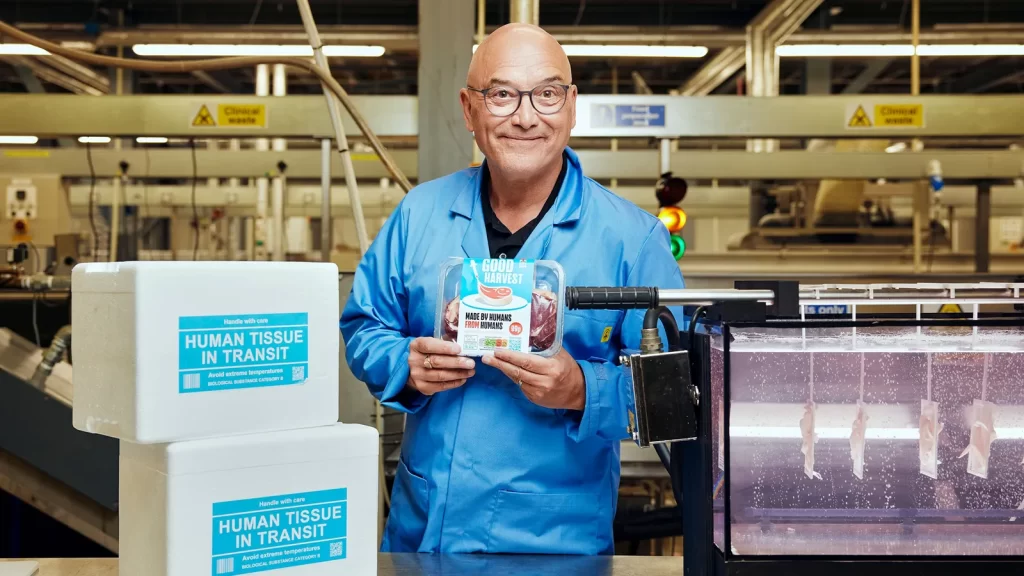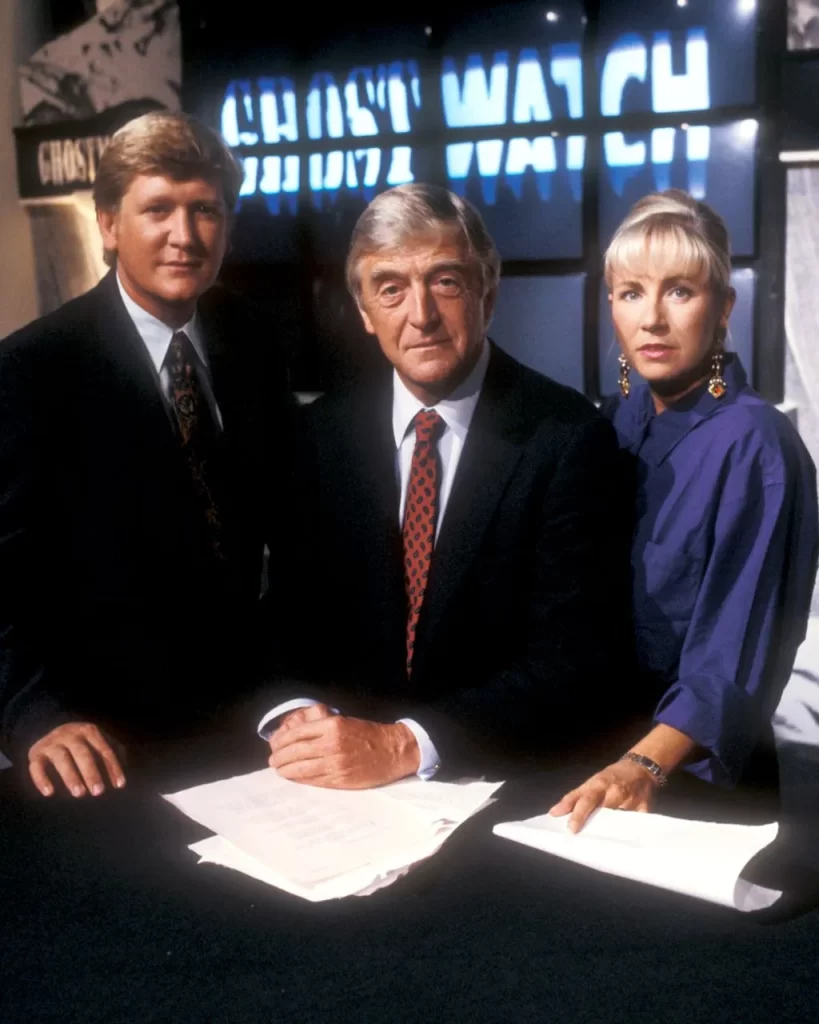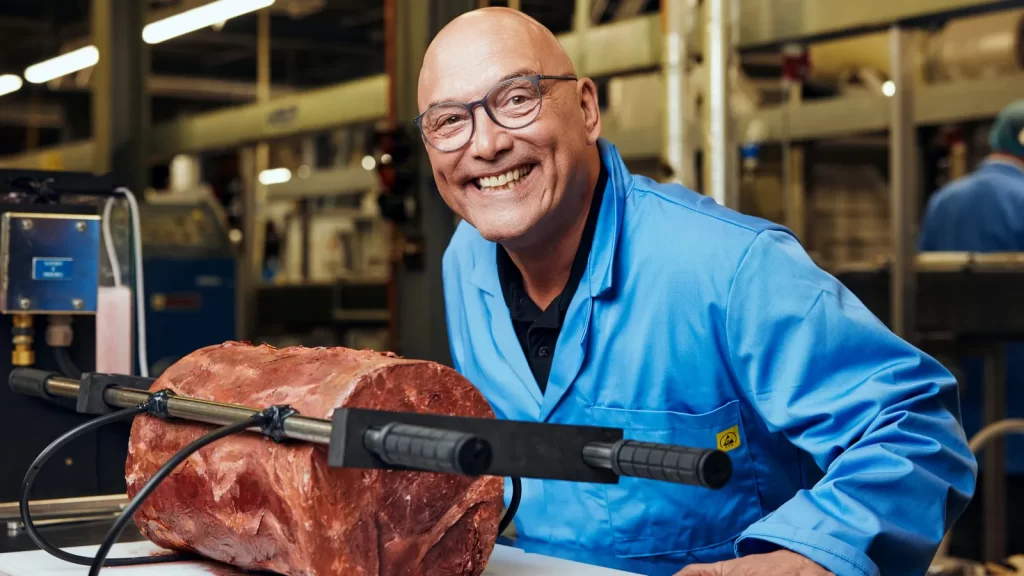UK viewers watched a new documentary with horror on Monday night. Gregg Wallace: The British Miracle Meat, a Channel 4 programme, was about new food technology. Wallace, a BBC MasterChef co-presenter, fronted it about human flesh-eating.
“This,” he said, beaming and holding out a steak, “is engineered human meat. That’s right, a protein made from human cells”. It looked like lightly marbled beef.
More like this:
– Cinema’s most shocking taboo
– The documentary horror that still terrifies
– The best TV shows of 2023 so far
Someone told us that Good Harvest is a company that produces six tonnes of engineered human meat every day. Wallace toured the production plant where thin slices of human flesh from paid donors grew into 30kg of meat “cakes” in nutrient-rich tanks.
The enthusiastic Wallace enlisted chef Michel Roux Jr. to sample some steaks with him. The pair discussed the terroir aspect of the meat – does the stuff grown from donors in the North East of England taste different to that from donors in the South East?
However, viewers were taking to social media to express their disgust but there was much worse to come.

Wallace interviewed a 67-year-old woman driven by the cost of living crisis to, reluctantly, donate. “You know there’s something wrong when you’ve got to jump on a bus and go and have some flesh scooped out of your arm for money,” she said.
Then we learned that the company’s new premium product would be meat created using “donations” from children. “It’s all gravy, baby, because our babies taste great with gravy,” chirped the voiceover on a promotional film.
However, viewers were taking to social media to express their disgust but there was much worse to come.
The director Tom Kingsley says the show mocked our acceptance of living misery. He says: “We wanted to anger the audience about our country’s unfairness and awfulness.”
Viewers’ reaction proves our point: if people could believe it was real then it shows how bleak things really have become
Tom Kingsley
“Some thought it was believable. However, their reaction proves our point: if people could believe it was real then it shows how bleak things really have become.”
“But Kingsley says the filmmakers didn’t set out to hoodwink viewers. Because we didn’t mean to hoax anyone – we just wanted to surprise them with satire. I mimicked a TV documentary style, but I didn’t think people would fall for it for long.”
“As well as targeting the establishment, we’re also making fun of the way that TV documentaries can be really superficial. Similarly, presenters don’t ask challenging questions, and problematic details are skipped over quickly.”
The history of TV hoaxes
Miracle Meat is not the only TV hoax. Shows like Brass Eye and Da Ali G Show on Channel 4 also tricked people. They pretended to be serious documentaries and asked silly questions. The viewers knew it was a joke, but the participants did not.
Then the Netherlands had The Great Donor Show in 2007, in which a supposedly terminally ill woman selected the recipient of one of her kidneys. The intention was to highlight the need for donors.
Music producer Ray Santilli claimed to have discovered supposed footage of an alien autopsy, which Fox Television broadcast in 1995, under the title Alien Autopsy: Fact or Fiction. This was perhaps fake news in another category. (In a 2006 documentary, Santilli admitted that the film was fake, though he alleged that it was based on actual alien autopsy footage he had seen).

TV Viewership
And TV viewers have learned to be especially wary on April Fool’s Day. As far back as 1 April 1957, the BBC’s current affairs programme Panorama carried a report about that year’s bountiful spaghetti tree harvest. Australia’s This Day Tonight once reported that the Sydney Opera House was sinking. France 3 claimed that the French government was going to release giant pandas in the Pyrenees. Russian Public TV carried a story that a spring in the Caucasus mountains could cure male baldness.
But the TV hoax without equality was not an April Fool’s gag. British TV “event” Ghostwatch was broadcast on BBC One on Halloween 1992. Presented as a live broadcast hosted by Michael Parkinson, its supposed purpose was to gather evidence of the supernatural. It featured footage of poltergeist phenomena and culminated in a malevolent entity taking over the TV studio. It was genuinely terrifying, resulting in tens of thousands of calls to the BBC and outrage in the newspapers.
“Ghostwatch was always intended to be two things,” its writer Stephen Volk tells BBC Culture. “First of all, a scary ghost story. Secondly, there was going to be a subtext of satire regarding television itself and the way the media was going. The idea of a BBC light entertainment show exploring the metaphysics of paranormal research using well-known TV personalities was just too delicious and potent and irresistible a mix.”
“Centrally, as a drama – and this gets overlooked in the obsession with it being a ‘prank’ – Ghostwatch was about, who do you trust? Do you trust this broadcaster? This expert, just because they have a caption in front of them? Do you trust this image we are showing you? Do you trust your eyes?
“We now live firmly in the age of fake news – even before we get into AI – so there’s never been a more important time to get people to question where they are getting their information, from whom, and whether they can trust it.”
This why
TV hoaxes like Ghostwatch have been influential in creating shows that challenge the viewers’ perception of reality. For example, Derren Brown: Séance, in which the famed illusionist purported to hold a live séance. We can only wonder what future shows might be cooked up as a result of Miracle Meat.
Love film and TV? Join BBC Culture Film and TV Club on Facebook, a community for cinephiles all over the world.
If you would like to comment on this story or anything else you have seen on BBC Culture, head over to our Facebook page or message us on Twitter.
And if you liked this story, sign up for the weekly bbc.com features newsletter, called The Essential List. A handpicked selection of stories from BBC Future, Culture, Worklife and Travel, is delivered to your inbox every Friday.
Source: BBC – By Neil Armstrong
Other Fact Checks
Corpse Discovery of a Man in his 40s in Bamenda Under Suspicious Circumstances is True
The Role of Clickbait and Sensationalism in Creating Disinformation and its Impact on Society
The Article “Welcome to Yaounde” by TGP Newspaper is Misleading
Eric Tataw’s Recent Arrest is Not Connected to His Separatist Links

